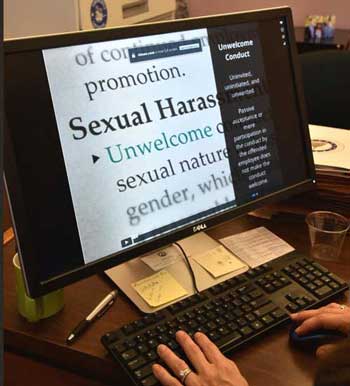The OCWR has numerous resources for employees working out of the D.C. area, including a downloadable poster of Workplace Rights provided by the Congressional Accountability Act of 1995 (CAA.)
Understanding rights and protections
Additional details about the protections are available on our website. Questions? At any point you may call our office at 202-724-9250 to confidentially discuss workplace rights under the CAA and to learn more about our process. You can also reach OCWR staff via email.
Certain claims of CAA violations must go through a mandatory, multi-step dispute resolution process. All employees, including district and state office staff, must follow established dispute resolution procedures in order to process their claims under the CAA. Several charts about the new process are also available for download: Most claims, Claims against Members of Congress, Claims filed by Library of Congress employees
Legislative branch employees may electronically file a claim with the OCWR. Claims must allege a violation of the CAA.

The OCWR now provides employees, at no cost, the services of a Confidential Advisor. Employees may meet with the Confidential Advisor to discuss their workplace concerns, and the Advisor will inform them of their rights and options under the CAA. The Confidential Advisor also may help an employee draft a claim, but may not represent the employee in any proceeding.
The OCWR provides out-of-area employees with the ability to remotely and securely access confidential advising, mediation, hearings, and appeals processes using Cisco Webex secure Audio/Video conferencing.
Each remote session is confidential and password-protected. The OCWR will share the details of the secure audio/video conference prior to the session. Employees may connect using a computer with internet access or using a SmartPhone. To download the Webex application prior to the conference, see instructions for Android devices here and the instructions for Apple iOS here. The details for joining the Cisco webex meeting are here.
Training
Available online and via webinar by request, courses include:

- A bystander’s response to harassment and discrimination: Should you say something? What should you say? Then what? Bystander Intervention recognizes that people are more likely to act when they see inappropriate behavior if they know how to get involved. This unique, practical training focuses on recognizing offensive and discriminatory conduct and the range of ways to respond. (30 min.)
- Introduction to FMLA: Expecting? Adopting? Deploying? Caring for an ill loved one? This course outlines the requirements of the FMLA, including eligibility and entitlement, as well as employees’ and employers’ obligations under the FMLA as applied to Congress. (15 min.)
- Preventing Sexual Harassment: This comprehensive interactive course about preventing sexual harassment goes beyond the legal definitions of quid pro quo and hostile work environment to dealing with nuanced situations such compliments, hugs, and jokes that might go too far. The course contains practical advice about real-workplace scenarios and nipping inappropriate behaviors in the bud. (30 min.)
- Preventing Disability Discrimination: Learning more about the ADA and reasonable accommodation in the workplace can help employers and employees recognize their rights and responsibilities and create a more welcoming and inclusive workplace. This module covers the definition of a qualified person with a disability, explores the responsibilities of the employer to the needs of the employee with a disability, and discusses the privacy issues around medical information. (25 min.)
- Recognizing and Preventing Discrimination and Harassment: This course meets the requirements for Senate-mandated training and includes a detailed overview of workplace discrimination, harassment, and retaliation. In addition to the legal definitions of under the laws incorporated by the CAA, the course also examines the roles that employees, supervisors, and bystanders have in preventing offensive conduct and reporting and correcting behaviors that could contribute to a hostile work environment. (40 min.)
The OCWR also provides educational publications including YourRights@Work, OSH/ADA Resources and Fast Facts, e-Newsletters and more.
Safety and Accessibility
The OCWR also provides safety and health and accessibility information. Please see Tips for Improving Office Safety and Improving Accessibility in Offices. Offices are encouraged to complete self-certification to ensure that district and state offices meet basic safety standards. You may also call the OCWR for additional assistance at 202-724-9250.